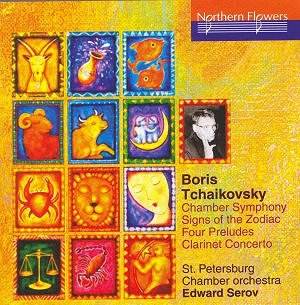AVAILABILITY
phone/fax +7 812 3872332
www.nflowers.ru
flowers@nflowers.ru
Boris Tchaikovsky Society:http://www.mmv.ru/p/bt/
Boris Alexandrovich Tchaikovsky was
a Muscovite born into a cultured professional
family sympathetic to and knowledgeable
about the arts. He entered the Moscow
Conservatoire in 1941 although the war
almost immediately uprooted him to military
service. He returned to the Conservatoire
in 1944 where his composition teachers
were Shebalin (do try his symphonies
on Olympia), Miaskovsky and Shostakovich.
His piano professor was Lev Oborin.
He wrote four symphonies, a sinfonietta,
a chamber symphony, concertos for violin,
cello, clarinet and piano as well as
six string quartets and music for more
than thirty films.
The Chamber Symphony
is in six named movements. The
music has none of the accoutrements
of Shostakovich. While there is a slight
dissonance overwhelmingly it is sweet
with the dissonance avoiding the caramel
sickliness which can afflict the works
of Boiko, Karayev and Silvestrov. The
acidic edge can be experienced through
the Sonata first movement; the
sugary quality in the Interlude and
Serenade with its harpsichord
presence. The harpsichord continues
into the March Tunes where the
composer comes closest to Shostakovich
- even so not very close. The Serenade
seems deliberately evocative of
a Mozartian cassation given a keen edge
by a very 20th century disillusion.
The piece finally resolves into a contented
fade-down.
Seven years later comes
Signs of the Zodiac -
a four song cycle with soprano, harpsichord
and string orchestra. The language is
pretty much unchanged from the Chamber
Symphony and the dissonance does
not approach that to be found in some
Lokshin or Khrennikov at least when
the latter was in his avant-garde phase.
The poems are printed in the booklet
in both Cyrillic and English translation.
After a lengthy reflective prelude we
come to the settings of poems by Fyodor
Tyutchev, Alexander Blok (whose On
the Field of Kullikovo was brilliantly
set by Yuri Shaporin as a cantata -
warrants a CD issue of the Svetlanov
recording), Marina Tsvetaeva and Nikolai
Zabolotsky. These poems are preoccupied
with death but the results, unlike those
in Shostakovich, are not macabre - rather
tender, surprisingly humane. Cross
o'The Four Roads, the Tsvetaeva
setting, is playful. There are some
beautiful effects here (tr. 10). While
far from being a style-mate this anthology
would go well with Britten's Serenade
and Les Illuminations. Masterful
and extremely imaginative settings well
sung and performed. Miroshnikova avoids
the usual Slavonic vocal sins.
The 1984 Four
Preludes are in a single track.
The language is terser, more troubled;
caustic with needy, acidic work for
the string orchestra, trumpet and percussion.
The work is an orchestra-only version
of a suppressed song cycle setting four
poems by the proscribed emigré
poet Joseph Brodsky. The tinkle of percussion
in the last section suggests the composer
might well have been influenced by the
final pages of Shostakovich's last symphony.
The Clarinet Concerto
is the earliest work here. It is
a lyrical piece that is Finzian in its
dedication to song and singing. An elegiac
first movement complete with singing
line and idyllic pizzicato is followed
by the stunningly virtuosic flight of
a Vivace running without pause
into the chattering Allegro which
comes a close second to Vivaldi's Winter.
The clarinet takes time out to return
to an affectingly mellifluous cantabile
which appears with a sparingly applied
icy sprinkling of trumpet-led ‘Big Top’
stuff.
This disc was made in collaboration
with the Boris Tchaikovsky Society.
It merits the attention of serious collectors
everywhere. Those who are collecting
ASV's series of British light music
concertos should not miss the Clarinet
Concerto.
Rob Barnett
